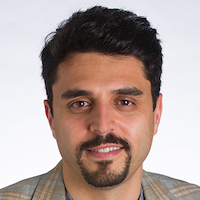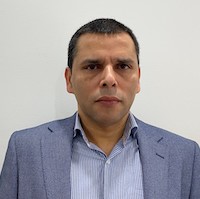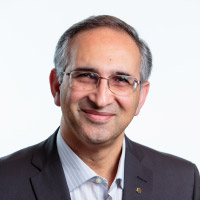Infrastructure
Transforming the planning, delivery and management of sustainable infrastructure for future generations.
We develop advanced solutions to integrate whole-of-life, and whole of society implications into the development of new infrastructure, and improved management of infrastructure that already exists.
What is infrastructure?
Infrastructure encompasses all the ways people modify and inhabit the landscape, to live, work and play. It includes the structures created to connect people, providing critical services such as power, water, transport and telecommunications. The decisions we make today about this infrastructure will affect many generations to come, shaping our towns and cities, and our lives. Future Infrastructure will be sustainably designed and maintained.
Why is it important?
Sustainability is an essential design criterion for any new infrastructure, with a whole-of-life approach needed, from the sourcing of materials, construction, operation, maintenance and eventual decommissioning. We need detailed evaluations across multi-generational timelines to optimise the operational life and returns on investment.
The coronavirus pandemic in 2020 has brought about a fundamental shift and re-evaluation of the ways we interact with our built infrastructure and with each other. The integration of infrastructure data from diverse sources is accelerating, for example across multiple government departments.
This shift provides an opportunity to undertake virtual design and evaluation of construction to test the impacts of different scenarios on the project at hand, and on the broader environment. This extends to the operation and maintenance needs of infrastructure, and from prefabricated building components to mega projects such as new underground railway networks.
Our collaborators
- Arup
- ATC Williams
- BP
- City of Melbourne
- Department of Environment, Land, Water and Planning (DELWP)
- Downer
- Geoexchange
- GHD
- Golder
- Government of Victoria
- Ground Source Systems
- Hot Dry Rocks
- Intergovernmental Committee on Surveying and Mapping (ICSM)
- Land Equity International
- Melbourne Metro
- Spatial Vision
- Sustainability Victoria
- Tyre Stewardship Australia
- Victoria Police
Get in Touch
Please get in contact with us for more information.
Our research collaborations deliver innovative solutions to improve infrastructure productivity, energy efficiency and functionality.
We bring together four strategic focus areas to address some of society’s biggest challenges. Through better design, we will develop and maintain the sustainable infrastructure of the future.
-
Modular construction and building performance
Developing prefabricated processes for fast, efficient and cost-effective construction of new buildings.
-
Critical infrastructure
Enhancing the construction, operation, maintenance and protection of critical infrastructure.
-
Built environment Digital Twins and simulation
Developing spatially enabled digital twin solutions to improve decision-making.
-
Mega-projects, procurement and circular economy
Integrating the whole-of-life value into major construction projects to ensure the re-use and recycling of resources to maximise return and value.
Get in Touch
Please email us or fill out our enquiry form for more information.
Our research centres
Our short and long-term industry-led collaborations develop new sustainable technologies, products and services that deliver tangible outcomes for the Australian construction industry.
-
Asia-Pacific Prefab Innovation Centre
This is an extension of the Asia-Pacific Research Network for Resilient Affordable Housing. It focuses on developing new low-cost, lightweight and durable prefabricated building materials and systems. The centre will become a regional R&D hub, accelerating technology uptake and providing opportunities to work with partners in a $5-trillion housing and infrastructure market.
-
CAMP.H website
This centre aims to unlock the potential growth of Australia’s prefabricated building industry by creating a cooperative training system between industry and universities. It has four university and 12 industry partners collaborating on breakthrough product and process innovations for eco-friendly, prefabricated housing, with the potential to deliver employment growth and increase product and service exports.
-
Cooperative Research Centres (CRC) Program
Through deep collaboration and new technologies of the 4th industrial age, Building 4.0 CRC will catapult the industry into an efficient, connected and customer-centric future. This will deliver better buildings at lower cost and the human capacity to lead this future industry.
-
Centre for Spatial Data Infrastructures and Land Administration (CSDILA)
The centre undertakes world-class research and development relating to spatial data infrastructures, spatial enablement and land administration and modernisation to provide innovative solutions to support different applications and the Sustainable Development Goals.
-
Centre for Disaster Management and Public Safety (CDMPS)
Delivering world-class research and innovation to improve the whole-system response and resilience of infrastructure, institutions and communities against extreme events and critical incidents, and contribute to the Sustainable Development Goals.
Meet our team of world-renowned researchers, engineers, and talented staff.
Research theme leaders
Academic Working Group
 Ellie Hajizadeh , Expertise in Materials Informatics, Sustainable and Green Materials & Manufacturing, involved in the digital twin, digital earth, simulations, and modelling. Interest in new domains including Digital Alchemy in digital twin, critical infrastructure, and Building Materials
Ellie Hajizadeh , Expertise in Materials Informatics, Sustainable and Green Materials & Manufacturing, involved in the digital twin, digital earth, simulations, and modelling. Interest in new domains including Digital Alchemy in digital twin, critical infrastructure, and Building Materials Mohsen Kalantari , Building Information Modelling, Digital Twin, Digital Engineering, 3D Spatial Data Infrastructure
Mohsen Kalantari , Building Information Modelling, Digital Twin, Digital Engineering, 3D Spatial Data Infrastructure Dr Jagannath Aryal , Built Environment, Digital Twin, Digital Earth, Simulations and Modelling
Dr Jagannath Aryal , Built Environment, Digital Twin, Digital Earth, Simulations and Modelling Associate Professor Mahdi Miri Disfani , Active in Sustainable Geotechnics, Recycled Material in Pavement Geotechnics and Application of Optic Fibres for Geo-Structure Health Monitoring
Associate Professor Mahdi Miri Disfani , Active in Sustainable Geotechnics, Recycled Material in Pavement Geotechnics and Application of Optic Fibres for Geo-Structure Health Monitoring Professor Nelson Lam , Robustness of built infrastructure in rare events of collision, extreme bad weather, landslides/rockfalls, and earthquakes. Design and assessment of structures including modular buildings to achieve satisfactory performance in these rare events.
Professor Nelson Lam , Robustness of built infrastructure in rare events of collision, extreme bad weather, landslides/rockfalls, and earthquakes. Design and assessment of structures including modular buildings to achieve satisfactory performance in these rare events. Felix Hui , Lean construction, mega-projects, project management, circular economy, sustainable manufacturing
Felix Hui , Lean construction, mega-projects, project management, circular economy, sustainable manufacturing
Get in Touch
Please email us or fill out our enquiry form for more information.
Contact us
We are client-focussed and collaborative – we work side-by-side with your leaders, engineers and technicians to develop solutions to your challenges.
From research to technical training and internships, get in contact with us about:
- Emerging technologies
- Developing technology strategies
- Technical training
- Engineering customised solutions
- Creating a talent pipeline through student engagement
- Leveraging our state-of-the-art research facilities
What challenges do you have? Let us help you solve them.
Make an enquiry and our business development team will contact you.







